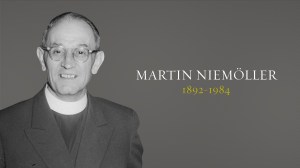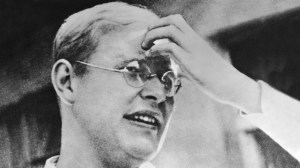In this series

Phrases like cheap grace, costly grace, and religionless Christianity are common coin, because they come from Dietrich Bonhoeffer’s two best-known books, The Cost of Discipleship and Letters and Papers from Prison.
But what about the rest of Bonhoeffer’s writings, now being republished in sixteen volumes in German? What else might today’s reader find stimulating and helpful?
Here are brief introductions to Bonhoeffer’s books, including many that deserve to be more widely known.
The Communion of Saints (1927)
His first two works, both academic dissertations, lay the foundations of his theology. Because of their technical character, they will never become bestsellers, but readers with specialized interests in theology, sociology, and philosophy are urged to tackle them.
In The Communion of Saints (Harper & Row, 1963)—which Karl Barth called “a theological miracle”—Bonhoeffer explores what it means to say that the church is “Christ existing as community.” To Bonhoeffer, the church is simultaneously (1) a reality of revelation, established in Christ, and (2) a human, social community amenable to sociological analysis. But not any sociology will do. In fact, one of the aims of this ambitious book, completed at age 21, is to articulate a “Christian social philosophy.”
For Bonhoeffer, all Christian doctrines have a “social intention” as well as a meaning for individuals. This book explores the social intention of the Christian doctrines of person, creation, sin, and revelation. Especially important is his view that individuals represent, and bear ethical responsibility for, their various communities: family, ethnic group, nation, and church. This belief undergirded his commitment to the Confessing Church and the resistance movement.
Act and Being (1930)
Act and Being (Harper & Row, 1962) qualified Bonhoeffer as a university lecturer. A tour de force, this most difficult and most ignored work of Bonhoeffer shows that the theologian is a sophisticated philosophical thinker. In it, he explores the subjects of his first book, but in dialogue with two major philosophical traditions—idealistic philosophies, and philosophies of being.
Above all, Bonhoeffer wants to show that philosophical systems presuppose particular views of human nature. And he engages the problem of the modern person who tries to reach self-understanding apart from God—a problem that was part of his own spiritual struggle. In contrast, he writes, a Christian self-understanding comes from hearing the Word of God.
Full of intellectual and personal passion, the book also yields some beautiful theological passages. “God is not free from human beings but free for us,” he writes. Christ is the Word of God’s freedom. Here is the deepest root of the famous phrase in Bonhoeffer’s later prison letters—the Christian life as “being for others.”
Creation and Fall (1932–33)
In the winter of 1932–33, Bonhoeffer gave lectures at the University of Berlin on the theological interpretation of the Genesis creation stories. These were published as Creation and Fall (Macmillan, 1966, now issued together with Temptation). This book is the most accessible entry into Bonhoeffer’s early theology. Many basic ideas from his two dissertations were presented here in a form that undergraduates could grasp.
In a meditation on the first three chapters of Genesis, Bonhoeffer asks this question: What do we learn if we read Genesis neither from the perspective of Darwin, nor from the perspective of creationists, but from the New Testament perspective of Christ? Bonhoeffer argues that being created in the image of God means we are created to live in co-humanity, as expressed in the relation of man and woman. God has covenanted to be free for us, so we reflect God’s freedom in being free for others. “Freedom is not a quality of a person, nor is it an ability, capacity, or attribute.… Freedom is not a possession, a thing, or an object. Freedom is a relationship and nothing else—a relationship, indeed, between two persons.”
Bonhoeffer further understands from creation that human beings are both spirit and body. “Flight from the body is as much flight from humanity as is flight from the spirit.” Here is a strong corrective to any unbiblical spirituality, important for a whole range of ethical issues from ecology to sexuality.
Christ the Center (1933)
Hitler became chancellor in January, 1933, and Bonhoeffer’s lectures that summer were his last at the university. His subject was Christology. Carefully reconstructed from sets of student notes, these lectures were published as Christ the Center (Harper & Row, rev. translation, 1978).
Bonhoeffer insists that Jesus Christ is God “for me.” He is present in Word, sacrament, and congregation. But this Christ who is present in the most personal way is also Mediator of all human existence, of history, and of nature.
Bonhoeffer also saw Christ as mediator of the political history of the state. Bonhoeffer’s reflections on false messiahs was a direct challenge to Hitler. His meditation on Jesus, the humiliated and crucified Messiah, was a call to himself to walk the way of the cross, to take up political resistance for the sake of a better state more truly reflecting God’s rule.
The Cost of Discipleship (1937) Life Together (1938)
Bonhoeffer’s next major work was The Cost of Discipleship (in German, simply Nachfolge, “following after”; English translation, Macmillan, 1963). This extended meditation on the Sermon on the Mount reflects his commitment to personal discipleship. It also captures the struggle of Christians in Germany to remain faithful, rather than become followers of a religion that legitimized Hitler.
In Life Together (Harper & Row, 1954), written the following year, Bonhoeffer theologically interprets the daily life of the seminary he directed. “The more genuine and the deeper our community becomes,” he writes “the more will everything else between us recede, the more clearly and purely will Jesus Christ and his work become the one and only thing that is vital between us.”
Ethics (1943)
Ethics, on which Bonhoeffer worked from 1940 to 1943, was intended to be a magnum opus. But it was never finished.
Bonhoeffer composed its manuscripts during the time of his political resistance activity. Portions were even temporarily confiscated by the Gestapo when he was arrested and imprisoned in April 1943. Thus, questions remain about how the manuscripts are to be ordered. The second English edition (Macmillan, 1965) rearranges the order of the manuscripts; the new German edition will present yet a third arrangement. But such technical problems are for scholars to worry about. The reader looking for insights on living the Christian life will find plenty.
To begin with, Bonhoeffer repudiates the idea that Christian ethics is concerned with the knowledge of good and evil. One must reject the questions “How can I be good?” and “How can I do good?” and instead ask “the utterly and totally different question, ‘What is the will of God?’ ” The God who is incarnate, crucified, and resurrected in Jesus Christ is the ultimate reality. Thus, Bonhoeffer argues, Christian ethics is about the formation of human life into the form of Christ.
For Bonhoeffer, Christians do not live in a separate divine, holy, and supernatural sphere. Rather, they must seek and do God’s will in the natural, historical, public world—in work, marriage, government, and church. As a theologian involved in political resistance against tyranny, Bonhoeffer asked, What does it mean to act responsibly for nation and church? A free and responsible life, he concluded, means acting on behalf of others, in accordance with reality, and being willing to accept guilt. In other words, doing the will of God is finally rooted only in the grace of God.
Fiction from Prison (1944)
In his first year in prison, Bonhoeffer tried to take stock of his life with attempts at a play and a novel. These were published as Fiction from Prison (Fortress, 1981).
This highly autobiographical book gives an intimate glimpse into the Bonhoeffer family. It expresses through characters and conversation some of Bonhoeffer’s most distinctive theological ideas.
Letters and Papers from Prison (1944)
Anyone who has not read Letters and Papers from Prison (Macmillan, 1972) has an intellectual feast in store. The book electrified theological debate in this century.
These letters ask the provocative question: Who is Jesus Christ for modern people who have “come of age” and outgrown religion? What may sound like the much-dreaded “secular humanism” is, on the contrary, a profoundly Christocentric theology of the cross.
If that sounds paradoxical, begin with the letter of July 21, 1944, the day following the failed assassination attempt on Hitler. Bonhoeffer wrote that “the church is the church only when it exists for others.… The church must share in the secular problems of ordinary human life, not dominating, but helping and serving.” In a letter of August 21, he wrote, “If we are to learn what God promises, and what he fulfills, we must persevere in quiet meditation on the life, sayings, deeds, sufferings, and death of Jesus.”
Other Writings
Finally, several works contain shorter writings of Bonhoeffer. Their titles are self-explanatory:
• Psalms: Prayer Book of the Bible (Augsburg, 1970)
• Prayers from Prison (Fortress, 1978)
• Spiritual Care (Fortress, 1985)
• Meditating on the Word (Cowley, 1986).
Works by Bonhoeffer are also contained in John D. Godsey’s Preface to Bonhoeffer: The Man and Two of His Shorter Writings (Fortress, 1965) and Clyde Fant’s Bonhoeffer: Worldly Preaching (Thomas Nelson, 1975).
Selections from Bonhoeffer’s collected writings were edited and published by Edwin Robertson as No Rusty Swords, The Way to Freedom, and True Patriotism (Harper & Row, 1965, 1966, and 1973).
Two Recent Anthologies
Fortunately, two recent anthologies (with helpful introductions and notes) make a selection of Bonhoeffer’s writings readily available.
The first is John de Gruchy’s Dietrich Bonhoeffer: Witness to Jesus Christ (Augsburg Fortress, 1991), part of the excellent series “Makers of Modern Theology.”
Even more comprehensive is A Testament to Freedom: The Essential Writings of Dietrich Bonhoeffer, edited by Geffrey B. Kelly and F. Burton Nelson (HarperCollins, 1990). An anthology of nearly six hundred pages, it contains selections from all Bonhoeffer’s major books and from about thirty sermons. In addition, it offers selections from ecumenical addresses, occasional essays, and important letters.
Dr. Clifford Green is professor of theology and ethics and director of the public policy center at Hartford Seminary. He is author of The Sociality of Christ and Humanity: Dietrich Bonhoeffer's Early Theology, 1927–1933 (Scholars Press, 1975).
Copyright © 1991 by the author or Christianity Today/Christian History magazine. Click here for reprint information on Christian History.












